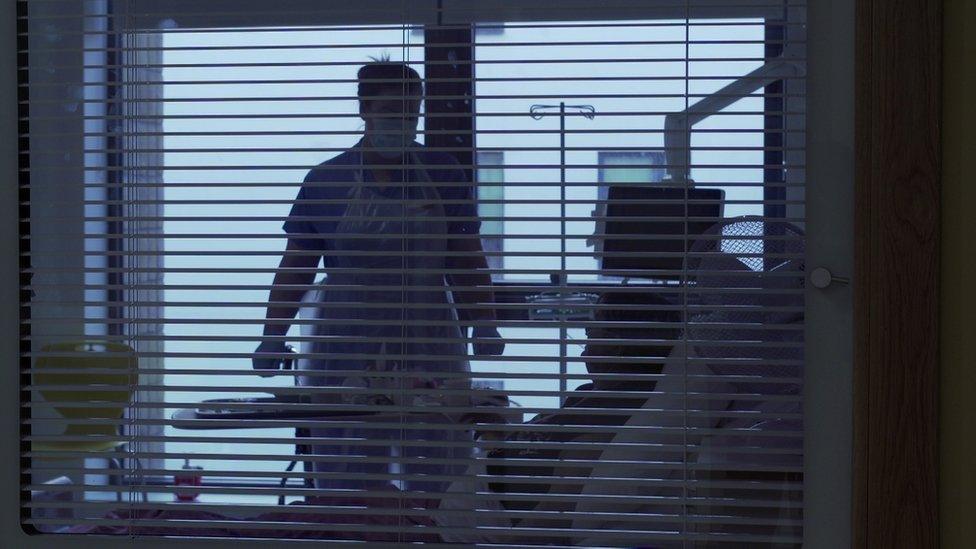Coronavirus: Concern over Altnagelvin hospital oxygen supplies
- Published
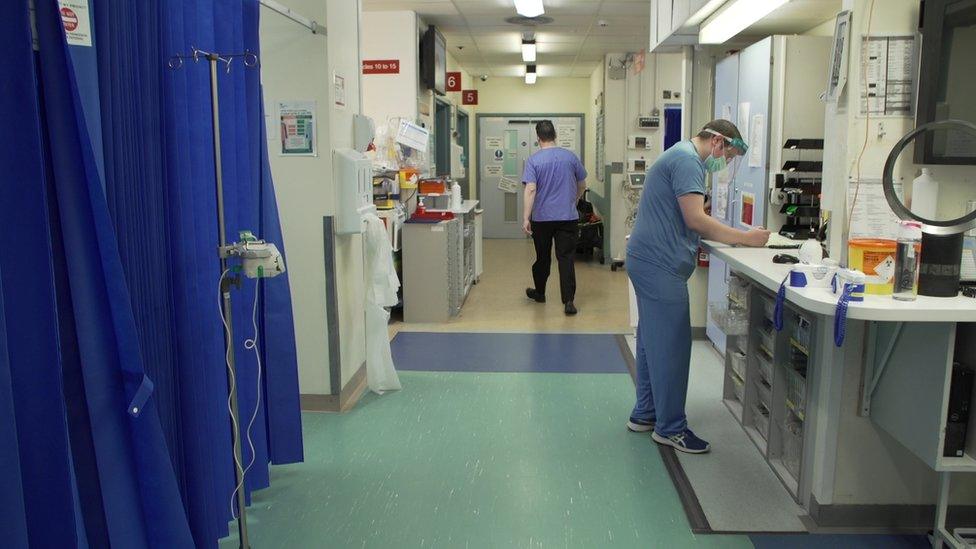
Oxygen supplies at Altnagelvin Hospital may have to be rationed if Covid-19 cases surge again, a senior manager has warned.
Sean Gibson, head of estate management at the Western Health Trust, said the hospital is using between 800 and 900 litres of oxygen a minute.
That is almost three times normal levels.
A spokesperson for the Western Trust said oxygen supplies were secure.
The number of Covid-19 cases in the Derry and Strabane District Council area has fallen dramatically since restrictions were imposed.
Mr Gibson told BBC News NI that he was concerned that if numbers started to grow again that there would be pressure on oxygen supplies.
He said: "We may have to ration oxygen - it's that serious."
The Western Trust spokesperson said the health service had mitigation measures in place if supplies to individual hospitals became an issue.
She added: "These include the provision of additional portable canister supplies and, if required, the centralisation of care in the regional Nightingale hospital at the City Hospital."
Northern Ireland's chief nursing officer Prof Charlotte McArdle said there was enough oxygen to cope with the surge in usage now and in the coming weeks, and that mitigations can be put in place to ensure "everyone receives the oxygen that they need".
“We may have to ration oxygen – it’s that serious.”
The hospital in Londonderry has developed a green, amber and red alert system to monitor the oxygen levels in a specially converted tank from Harland and Wolff shipyard in Belfast.
At present the levels are between green and amber - but just last week they were edging towards red, warned Mr Gibson.
"If things continue as they are then we will be in the red very, very quickly which is a very, very serious situation," he added.
"This plant has never seen this type of oxygen usage. It's designed to deliver but we don't really know until we see it happening."
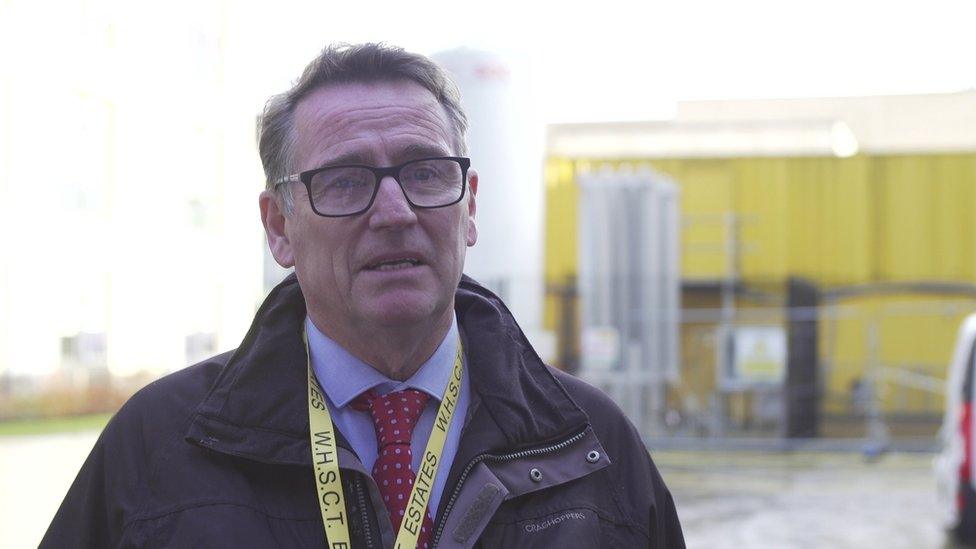
Sean Gibson said it is "no longer the case" that patients can take for granted there will be oxygen available to them
BBC News NI was invited into the hospital on Monday to highlight the pressures being caused by the pandemic on all aspects of care.
While Mr Gibson may not be a medic or wearing scrubs, he is very much on the frontline in the battle against Covid-19.
It's a role that gives him sleepless nights.
"We have people who are really ill in this hospital, we have three wards of them" he said.
He told the BBC he felt "very responsible that I can deliver the oxygen they require to get well and take the pressure off the hospital".
"Patients, when they come into the hospital they take for granted there will be oxygen available to them," he said.
'Choose between patients'
"Well, that's no longer the case.
"We have to remember all the other types of patients that are here - cardiology, maternity - they all need oxygen at some stage.
"But it's all being very focussed on our Covid patients - they can take up to 80 litres a minute - typically 50 litres a minute per patient.
"If you do the maths that's a lot of oxygen."
Mr Gibson said they did not want to be in a position where available oxygen levels meant teams would have to choose between patients who received it.
Prof McArdle, NI's chief nursing officer, said oxygen availability is looked at on a daily basis, with a situation report provided every day.
"Everybody is getting the oxygen that they need and should it continue at a very high level, there are other mitigations that can be put in place to make sure that everybody receives the oxygen that they need," she told Good Morning Ulster.
She said work was carried out at the start of the pandemic to "survey the supply of oxygen right across the hospital network and significant work was undertaken to improve that across the sites including Altnagelvin".
"That is one of the reasons why the Belfast City Hospital remains the Nightingale hospital, because there is increased infrastructure and a lot of work done there to ensure that it would have significant oxygen supplies to maintain that very high level of ICU (Intensive Care Unit)."
'On our knees'
Mr Gibson's worries about oxygen supplies are echoed throughout the sprawling hospital site.
On ward 26 - one of three dedicated Covid recovery units - nurse Mairead Meenan also expressed concerns.
The 51 year old from Creggan in Derry worked her way through the first wave of the pandemic but said it is now "completely different".
"We are on our knees at work," she said.
"People are coming in and they are so, so sick - it's completely different from the last time, it's scary watching them."
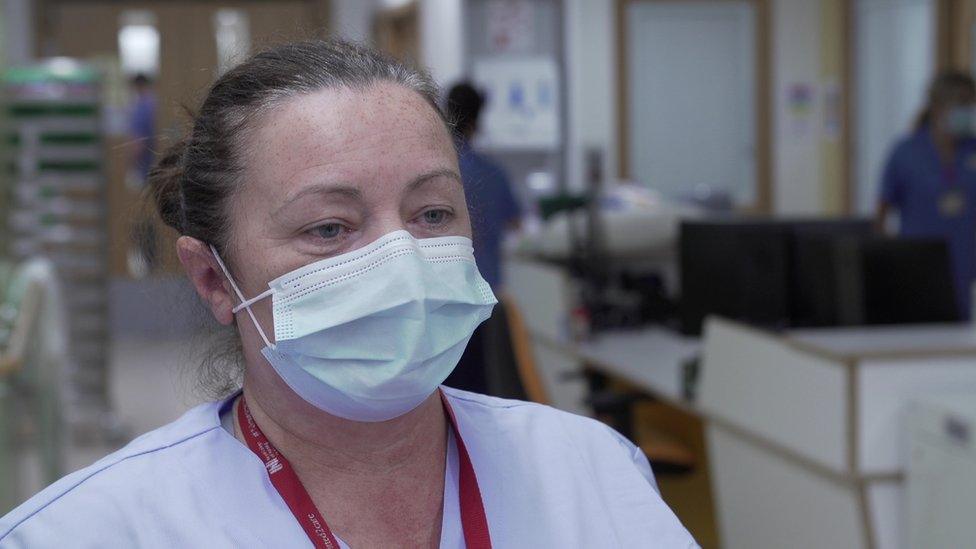
Mairead Meenan said the situation facing staff can be scary
She added: "On our ward at the minute we don't have anybody who is under eight litres of oxygen.
"That is a high volume of oxygen. So all this oxygen is being used at the one time - we have to spread it out, we have to be careful. It's just crazy.
"The oxygen is so important for the patients - they could become hypoxic where there is not enough going round their body. They are becoming so sick.
"So, we need to deliver it to them."
Prof McArdle said many nurses had made "personal sacrifices" with regard to their families and personal life to ensure patients "get the highest possible care".
"There are only so many ways we can stretch our staff, they have been redeployed into those very vital areas during the pandemic and that will continue over the winter I'm sure," she said.
She said that there was a "higher than normal sickness level" among staff.
"There are a number of staff either self-isolating or indeed ill from Covid, and then on top of that there are existing non-Covid related illnesses - so there is an unusually high number of staff unavailable for work on a two weekly cycle as we manage through the pandemic."
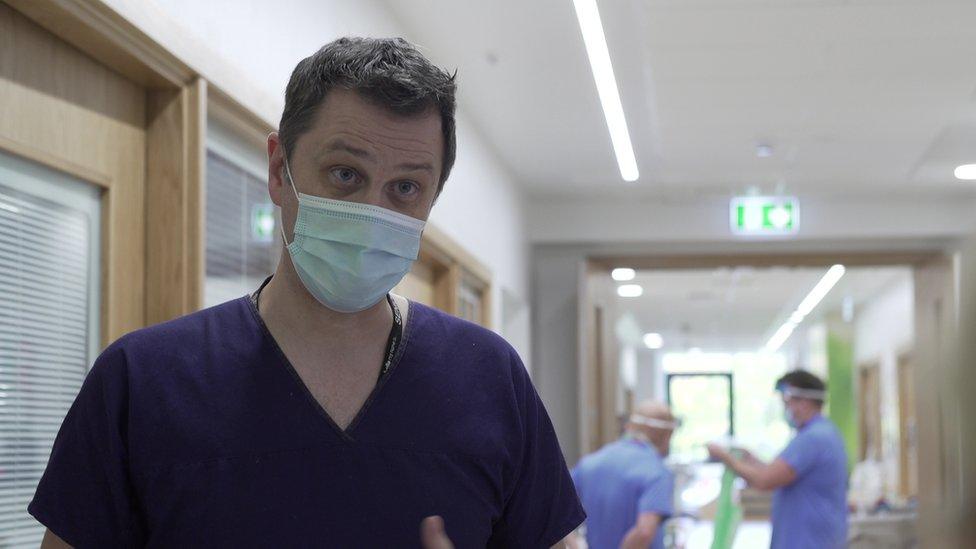
Neil Black said he has never experienced the "volume" of patients requiring oxygen treatment.
On ward 21, another Covid unit set up just a few weeks ago, consultant physician Neil Black said he had never before experienced the "volume" of patients requiring oxygen treatment.
"We have not seen this volume of people at one time all coming in with similar symptoms; similar level of oxygen dependence.
"And some of those people become really critically unwell.
"Most people get better by about day seven. But the people we are most concerned about are the people who are not getting better by that stage because they could be entering what's called a storm phase.
"At that stage their oxygen requirements become really quite high. We have had some people collapse because of low oxygen levels.
"Anyone needing oxygen like that can't go home - they need to stay in. Some require up to 60 litres of oxygen per minute.
"A lot of people require oxygen for several days."
The pandemic has placed many different issues on the public's radar that otherwise would have remained hidden.
Added to the ever increasing list is oxygen, something until now we took for granted.
The BBC is making a donation to replace any PPE used during the visit to Altnagelvin Hospital.
- Published28 October 2020
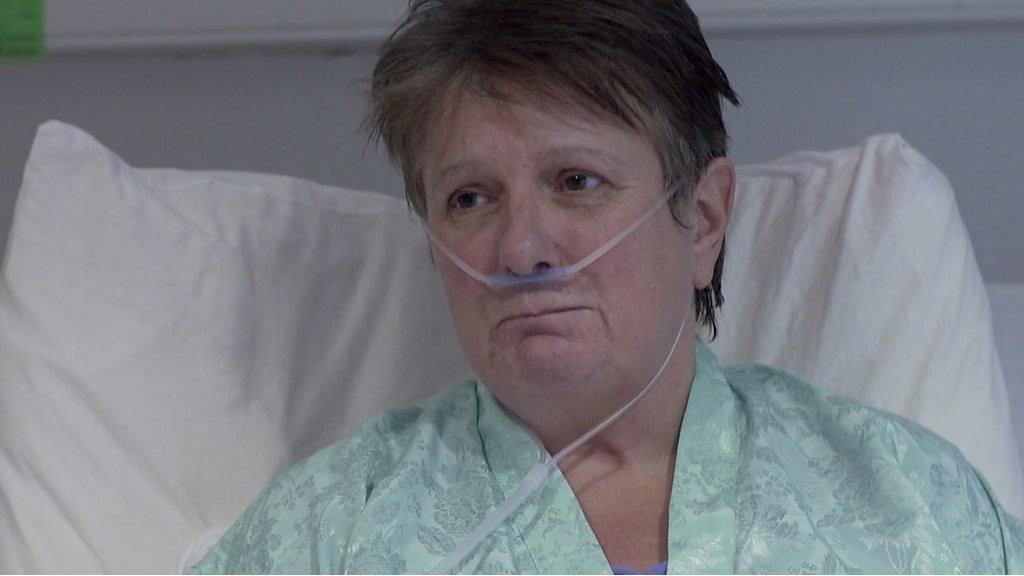
- Published28 October 2020
